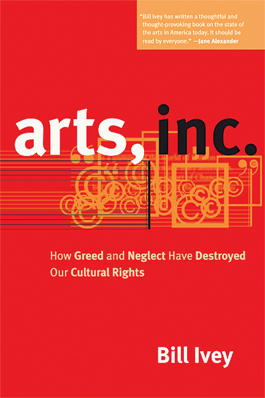
Arts, Inc.: How Greed and Neglect Have Destroyed Our Cultural Rights Bill Ivey (University of California Press, 2008)
Bill Ivey is one of the most articulate commentators on art and culture in America. He served as head of the National Endowment for the Arts during the Clinton Administration and prior to that was Executive Director of the Country Music Hall of Fame and active as a leader in NARAS, better known today as grammy.com. His lucid book, Arts, Inc., is one of the most insightful looks at arts and culture that you will find. For those in the music industry it should be a “must read,” although large organizations owning vast amounts of copyrights may squirm a bit.
The book begins with a “Cultural Bill of Rights,” six “rights” that include the “right to our heritage,” to “the prominent presence of artists in public life,” “to an artistic life,” “to be represented to the rest of the world by art that fairly and honestly communicates America’s democratic values and ideals,” “to know about and explore art of the highest quality” and “to healthy arts enterprises that can take risks and invest in innovation while serving communities and the public interest.”
This book is a manifesto but it doesn’t hit you over the head with one man’s opinions; instead, Ivey demonstrates, through good journalism, research and personal background that we need to re-think the role of arts and culture in America, especially as it relates to copyright law.
In the Introduction, Ivey gives some personal stories of interacting with the Clintons while he was head of the National Endowment for the Arts as well as some personal glimpses of his childhood. He uses this as a springboard to talk about culture and the arts in America and notes that “culture is more than the surface sheen of civilization; it’s an important reservoir of both identity and individual expression—a reservoir that must be well secured.”
Ivey states that “Government…has failed to protect the expressive lives of citizens and instead politicized and trivialized the cultural conversation, even allowing self-interested punditry, advertisers, and media executives to trample free-speech principles” and quotes cultural critic Lawrence Lessig, who states, “the law’s role is less and less to support creativity, and more and more to protect certain industries against competition.”
In a chapter on “Heritage” he notes that “the concentration of ownership of America’s intangible cultural heritage in fewer and fewer hands has followed the trend toward consolidation in our arts industry.” He criticizes corporations for “owning” America’s past, claiming copyright on works that lead to a suppression of cultural history. Record companies are criticized for owning vast stores of recordings that the public never hears and these companies block access to these recordings through copyright, which leads to “controlling” our heritage. Further, these record companies really don’t know what they own or how much has been lost.
Ivey criticizes the current copyright law but offers solutions, such as requiring copyright holders to pay modest fees in order to maintain copyright ownership rather than the current 95 years that record, movie and TV companies now have.
He discusses the isolation that classical music has imposed upon itself, taking itself out of popular culture, and compares American arts and culture policies and practices in the rest of the world. (Many other countries have a “Minister of Culture.”)
A chapter on “The Failure of Government” gives a good behind-the-scenes look at government dealing with the arts and, for the most part, it ain’t a pretty picture.
In his conclusion, Ivey notes that arts in the United States has gone from being participatory—people sitting at home playing and singing—to a consumer culture where we are a non-participatory audience. He asserts that “Today intellectual property law constitutes a constellation of constraint that locks up heritage, ties the hands of creativity, and assigns a price to an ever-widening spectrum of our expressive life” and that “claims of ownership in the U.S. arts system have begun to undermine the creative process.”
This review is much too short to do justice to such a well-thought-out book. For those who think seriously about arts and culture it is a must read.

About the Author
Don Cusic is Professor of Music Business at Belmont University. He has authored 18 books, including his most recent “Discovering Country Music.”View Author Profile



